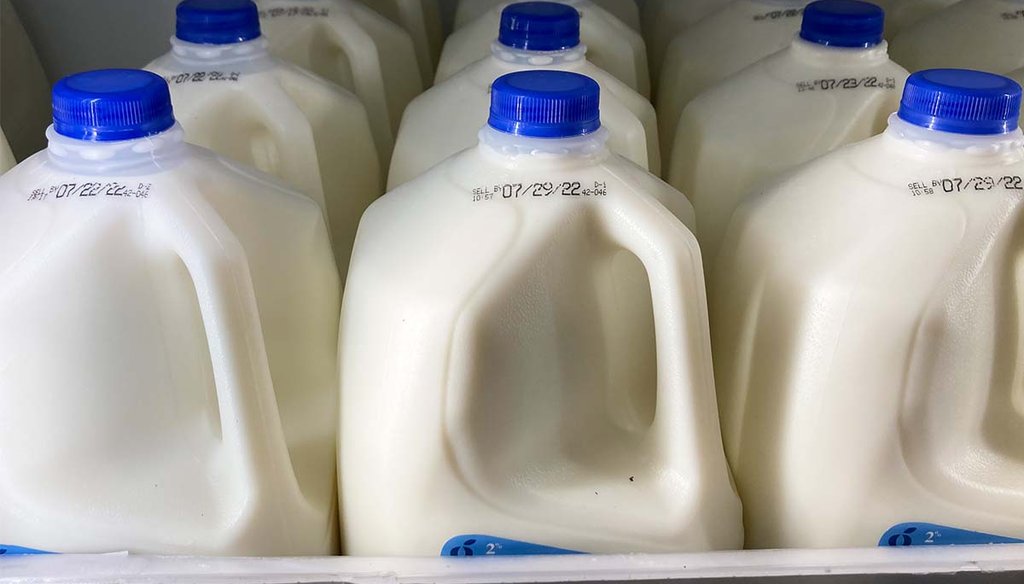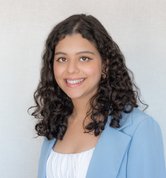Stand up for the facts!
Our only agenda is to publish the truth so you can be an informed participant in democracy.
We need your help.
I would like to contribute

Milk is displayed July 12, 2022, at a Philadelphia grocery store. (AP)
If Your Time is short
-
The post says its source is a study from Norway, but that study contradicts the post.
-
Scientists found that women who drank more than 3 cups of milk daily as adults had lower breast cancer incidence than women who didn’t drink milk.
-
Other studies have found that drinking milk could pose a possible risk of breast cancer. But experts said more research is necessary before reaching a conclusion like the Facebook post does.
A Facebook post says scientists have found what causes breast cancer and gives the impression that a lifestyle change could prevent developing the illness.
"Scientists found: what causes breast cancer and we drink it daily," says the text in the Spanish-language post. "Give it like and then … look at the first comment."
The post was flagged as part of Meta’s efforts to combat false news and misinformation on its News Feed. (Read more about our partnership with Meta, which owns Facebook and Instagram.)
The post links to an article that says a Norwegian study found that consuming 3 cups of milk daily can elevate the risk of developing breast cancer.
PolitiFact found a 2001 study from researchers associated with the Institute of Community Medicine of the University of Tromso and the Section of Medical Statistics of the University of Oslo in Norway.
The study examined 48,844 Norwegian premenopausal women and it followed up with them for 6.2 years; 317 of them reported breast cancer during that time. They consumed about 1.7 cups of milk per day.
The study also found that women who drank more than 3 cups of milk a day as adults had a lower breast cancer incident rate than the women who didn’t drink milk.
The scientists also found that premenopausal women who drank milk during childhood and adulthood, had lower breast cancer incidence rates. This study did not study women who had gone through menopause because they didn't have enough participants.
PolitiFact asked experts to weigh in on this study.
The Norwegian study found lower breast cancer risk in premenopausal women who consumed more than 3 cups of milk, said Dr. Kim Robien, an associate professor at George Washington University’s Milken Institute of Public Health.
Robien also said her institute does not make preventive dietary recommendations based only on one study, and that it’s important to consult multiple studies.
And Dr. Gary Fraser, a professor at Loma Linda University’s school of medicine, said the Norwegian study researchers didn’t account for other dietary factors, so it’s unknown whether they would have affected the study; only milk and its related products, such as cheese and yogurt, are left as possible causes.
Cancer Research U.K. said in a November 2021 article, "There is no good, consistent evidence that milk and dairy products can cause breast cancer." Some studies have found a link and others haven’t, said the research organization.
The organization also said that more high quality studies are needed to understand whether dairy consumption and breast cancer are linked.
"There's been no solid correlation between milk consumption and breast cancer," said Anees Chagpar, a professor in Yale School of Medicine’s surgery department.
An American Cancer Society spokesperson, Michele Money-Carson, told PolitiFact that the group does not have data or studies to support the Facebook post’s claim.
A 2020 American Cancer Society study said that a diet high in calcium and dairy products could lower breast cancer risk.
But another 2020 study, by Fraser and other Loma Linda University researchers said drinking two-thirds or 1 cup of milk daily could increase the risk of breast cancer.
It could be that milk was what caused cancer in the study participants, but that has not been proved, Fraser said. Cheese and yogurt consumption did not increase breast cancer risk, he said.
The study had 52,795 North American women (30 years old or older) from Adventist churches around the U.S. and Canada who had a diet based mainly on dairy and soy. The study followed the women for eight years and found that 1,057 developed breast cancer.
The American Institute for Cancer Research analyzed that study and concluded that the women consumed more than normal amounts of milk compared with other women, or mainly consumed soy.
The study was also observational, which means the researchers did not intervene in the participants’ diets or lifestyles. While they measured some factors like alcohol consumption and different dietary products, there might have been some dietary factors that were unaccounted for, the study said.
The American Institute for Cancer Research’s most recent report, published in 2017, analyzed global studies and did not find evidence linking dairy or dairy milk to breast cancer risk.
The U.S. Department of Agriculture recommends that women ages 19 and older consume 3 cups of dairy daily (this includes milk, yogurt and cheese.)
The American Cancer Society says breast cancer can be hereditary, though not always. Some factors that can increase the breast cancer risk are: drinking alcohol, being overweight after menopause, and some types of birth control.
A Facebook post claimed that scientists found that "people who consume 3 cups of milk daily have a higher risk of developing breast cancer."
The post says its source is a Norwegian study. But that 2001 study contradicts the post. The scientists found that women who drank more than 3 cups of milk daily had a lower breast cancer incidence rate than women who didn't drink milk. The study focused exclusively on premenopausal women.
A 2020 study found an association between milk consumption and breast cancer. But one of the researchers said that it’s unproved that milk was the main contributing factor.
Other scientific studies say more research is needed before reaching a conclusion like the Facebook post does.
We rate this claim Mostly False.
PolitiFact researcher Caryn Baird contributed to this fact-check.
Our Sources
Email interview with Dr. Kim Robien, an associate professor at George Washington University’s Milken Institute of Public Health, June 6, 2023
Email interview with Dr. Gary Fraser, a professor at Loma Linda University’s school of medicine, June 6, 2023
Cancer Research UK, "Can milk and dairy products cause cancer?," accessed May 11, 2023
American Institute for Cancer Research, "A study suggests milk increases the risk of breast cancer, but AICR experts say not so fast," accessed May 11, 2023
International Journal of Epidemiology, "Diary, soy, and risk of breast cancer: those confounded milks," accessed May 11, 2023
U.S. Department of Agriculture, "Dairy", accessed May 11, 2023
Wiley Online Library, "Childhood and adult milk consumption and risk of premenopausal breast cancer in a cohort of 48,844 women—the Norwegian women and cancer study," accessed May 11, 2023
Post on Facebook, May 10, 2023
Email interview with Michele Money-Carson, American Cancer Society spokesperson, May 22, 2023
American Cancer Society, "American Cancer Society Guideline for Diet and Physical Activity," accessed May 22, 2023
Phone interview with Dr. Nigel Brockton, vice president of research, American Institute for Cancer Research, May 23 2023






















